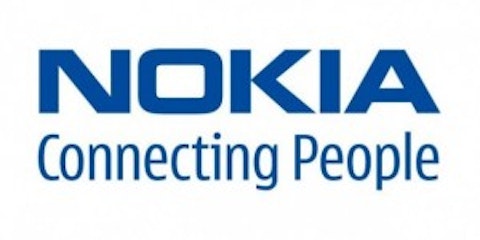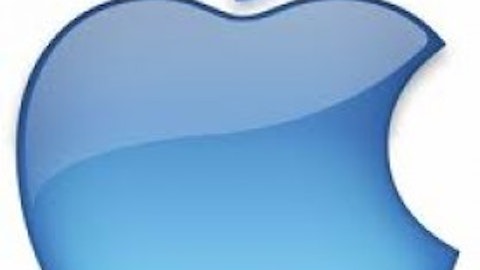
Nokia Corporation (ADR) (NYSE:NOK) had this to say in its 2012 20-F report released earlier in the year:
The agreements with Microsoft may include terms that prove unfavorable to us, or Microsoft could provide better support to another device manufacturer which produces devices that run on the Windows Phone platform.
Since the publication of the report, the terms of the partnership have not changed. Could Microsoft Corporation (NASDAQ:MSFT) be using the lack of exclusivity in the partnership as leverage for a wider-reaching ulterior goal? Pay close attention.
Notice Ballmer’s shift to ‘devices and services’?
Microsoft CEO Steve Ballmer might not be the most popular person among Microsoft Corporation (NASDAQ:MSFT) shareholders. Nonetheless, he hinted something very indicative recently. In his discussion on Microsoft’s overhaul and reorganization, Ballmer made an emphatic iteration of Microsoft’s renewed stance on devices and services.
Why devices and services? The PC isn’t exactly ‘dying,’ as many love to put it, but a good number of less-technical users, so to speak, are making the inevitable shift to mobile. The IDC notes that PC shipments, yet again, dipped in the April-June timeframe, this time slipping 11%. On the flipside, tablets and smartphones continue to make gains across the globe.
With Microsoft Corporation (NASDAQ:MSFT)’s reliance on the PC under threat, its new solid position on devices will, for the most part, be directed toward mobile. And with the Nokia partnership in place, things are starting to materialize. But wait, this is not the juice. Have you noticed that despite Microsoft’s strong cash position, it is doing little in its capacity to market Windows Phone? If anything, Nokia Corporation (ADR) (NYSE:NOK) is doing all the heavy lifting. Interestingly, this is what Microsoft Corporation (NASDAQ:MSFT) wants. It wants Nokia to do all the marketing for the Windows Phone and in the process wring dry its already depleted coffers.
Microsoft envisions a cash-strapped sinking Nokia
There is no denying that Nokia Corporation (ADR) (NYSE:NOK) is in the thick of financial woes. In a late 2012 move aimed at bringing in short term finance, the handset maker sold and leased back its Finnish headquarters for €170 million ($223.3 million). This is in spite of the fact that it had been operating from the building since 1997. This move also coincided with a controversial 10,000 layoffs. And now, Nokia’s balance sheet has taken yet another stretch after it agreed to sign off to paying €1.7 billion ($2.23 billion) for Siemens stake in the Nokia Corporation (ADR) (NYSE:NOK) Siemens Network joint venture.
As preposterous as it sounds, Microsoft Corporation (NASDAQ:MSFT) actually hopes that Nokia fails to plug the cash drain. It hopes that the only headline in Nokia’s ever-disappointing earnings reports remain “Lumia Phones gaining amid sinking Nokia business.” More still, it hopes that Nokia Corporation (ADR) (NYSE:NOK) uses the proceeds from Lumia to further market the flagship model, which of course touts the Windows Phone ecosystem as a unique selling point.
In the most recent quarter, Nokia posted losses of $0.06 per share. In view of this, the Finnish handset maker is cutting 440 jobs to control costs. The only thing that screamed bullish was increased sales for the Nokia Lumia units, which increased 32% to hit 7.4 million units.
Windows Phone potential immeasurable
From a strict tech standpoint, Windows Phone has immense potential. Apart from consolidating its place as third in relation to Research In Motion Ltd (NASDAQ:BBRY), it has the ability to grow immeasurably. This is because it appeals to the people who actually determine the success of ecosystems; enterprise and app developers.
Google Inc (NASDAQ:GOOG)’s Android, despite being a runaway success, has come under a lot of scrutiny from both enterprise clients and app developers. BBC reports that Android’s security has been found to be profoundly faulty by research firm BlueBlox. According to the research firm, all Android versions since 2009 have a security bug that exposes device users to extreme threats including eaves dropping, sending junk mail, data manipulation and data theft. Although Google Inc (NASDAQ:GOOG) has not commented, BlueBox’s findings remains consistent with a recent Juniper Networks, Inc. (NYSE:JNPR) mobile threats report which says that Android attacks are up from 24% in 2010 to 92% in 2013.
Even with the Bring Your Own Device concept, enterprise clients are less likely to encourage Android devices in the work in light of these kinds of security concerns. Such an occurrence could easily have a ripple effect and spill over into the consumer market. This will spotlight Windows Phone as a more secure ecosystem.
Android’s fractured ecosystem also presents a huge disadvantage to app developers. Because of the multiple platforms (Donut, Gingerbread, Ice Cream Sandwich), developers are finding it increasingly hard to maintain support across the board. And worse still, they are forced to work in the shadow of nameless fraudulent developers who look to go viral with suspicious apps that cause havoc rather than solve problems. This problem remains a thorn in the flesh of Android’s app ecosystem. Windows Phone can also capitalize on this mistake.
The fact that Windows Phone is also available on mid-range smartphones makes it a better pick for developers who want to extend their reach – nothing like Apple Inc. (NASDAQ:AAPL)’s iOS, which is limited to the high end of the market.
Conclusion
The potential for Windows Phone is immeasurable. And as Nokia Corporation (ADR) (NYSE:NOK)’s Lumia continues to gain traction, Windows Phone’s impact will be felt more and more.
But why isn’t Microsoft going the extra mile just yet? It’s simple. Let Nokia spend its cash, and when it has little to bargain for, swoop in. Nokia Corporation (ADR) (NYSE:NOK) will be defenseless because of its weak cash position and also because Microsoft Corporation (NASDAQ:MSFT) will leverage the lack of exclusivity in the partnership to push for a deal. And if you take a skewed look at it all, you will realize that this falls in line with Ballmer’s renewed ‘devices and services’ position; especially the devices part.
Nokia Corporation (ADR) (NYSE:NOK) is a good short-term buy. Microsoft however remains the better long-term investment.
The article Nokia Is Microsoft’s Endgame originally appeared on Fool.com and is written by Lennox Yieke.
Lennox Yieke has no position in any stocks mentioned. The Motley Fool recommends Google. The Motley Fool owns shares of Google Inc (NASDAQ:GOOG) and Microsoft Corporation (NASDAQ:MSFT). Lennox is a member of The Motley Fool Blog Network — entries represent the personal opinion of the blogger and are not formally edited.
Copyright © 1995 – 2013 The Motley Fool, LLC. All rights reserved. The Motley Fool has a disclosure policy.





